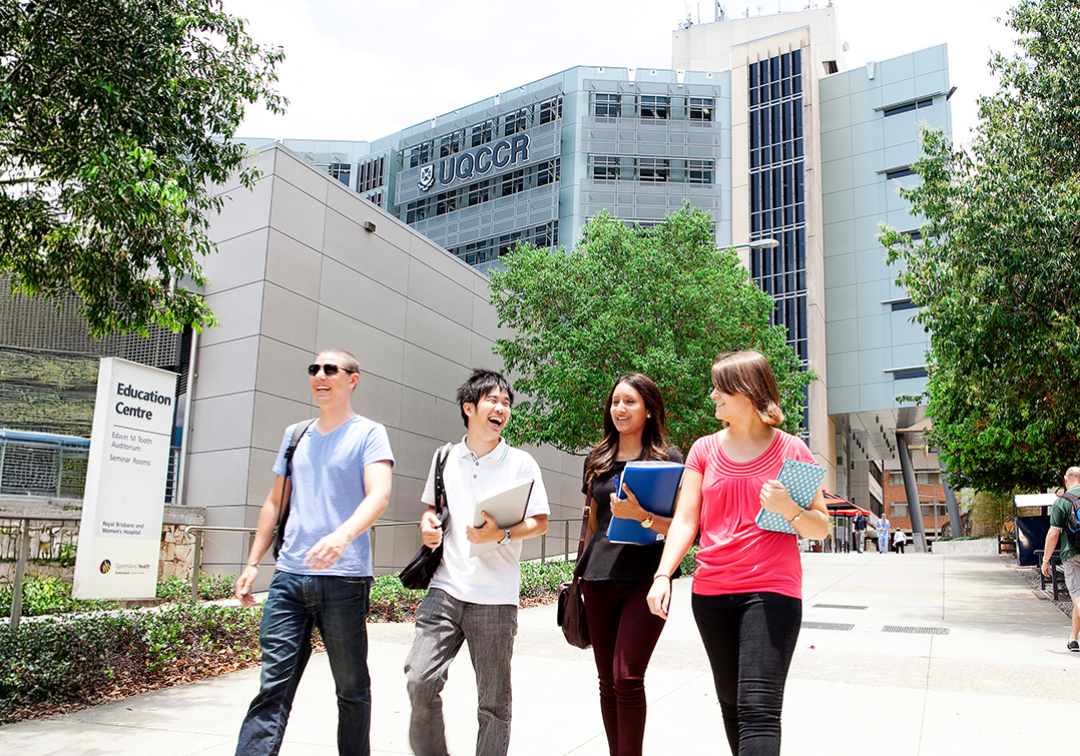
Bachelors of Music / Science
Overview
Turn your passion for music and science into a unique career with this dual degree.
This dual degree is designed to provide students with a professional career in music and a depth of understanding in one or more fields of knowledge in the sciences.
With more than 30 science study plans to choose from, you can create a set of skills and expertise that's unique to you and your passions.
Program highlights
- Enhance your music skills and bolster your career prospects with a deeper knowledge of the sciences.
- Work with staff members and alumni who are nationally and internationally acclaimed performers, composers, scientists and researchers.
- Develop the transferable skills essential to long-term job success across multiple sectors for your entire career.
Majors
Tailor your studies to suit your goals. This program offers these options:
- Environmental Science
- Environmental Science
- Genetics
- Geographical Science
How you'll learn
Your learning experiences are designed to best suit the learning outcomes of the courses you choose.
- Lectures
- Tutorials
- Work placements
- Overseas study
- Laboratory work
- Fieldwork
- Studios
- Workshops
What you'll study
At UQ, degrees are called 'programs' and subjects are called 'courses'.
See courses and program structure
View dual degree planner (PDF)
The 2025 dual degree planner is not yet available. The planner displayed is for a previous year and is a guide only.
Career possibilities
Our programs prepare you for your first job and beyond. Depending on which major you choose, here are some of the careers you could be on your way to:
- Music producer
- Classroom music teacher
- Environmental and science communicator
- Marine ecosystems researcher
- Earth science technician
- Music production program coordinator
- Orchestral musician
- Music programmer
Events
See all events
13 January - 13 January
Institute of Modern Languages High School Enrichment Program

7 April
International Baccalaureate Research Skills Program
Stories
See all stories
UQ people
What’s it like to be a first-year med student?
3-minute read

Uni life
Camila’s experience as a summer research scholar
5-minute read
Stories
See all stories
UQ people
What’s it like to be a first-year med student?
3-minute read

Uni life
Camila’s experience as a summer research scholar
5-minute read
Entry requirements
Prerequisites
- General English subject (Units 3 & 4, C); and
- Mathematical Methods (Units 3 & 4, C); and
- one of Biology, Chemistry, Earth and Environmental Science or Physics (Units 3 & 4, C); and
- an audition and interview with the School of Music.
Applicants must arrange an audition with the School of Music, to take place between 1 September and 30 November of the year preceding admission. For more information about the audition process (including closing dates and the application form) please visit the School of Music website.
Prerequisites
- General English subject (Units 3 & 4, C); and
- Mathematical Methods (Units 3 & 4, C); and
- one of Biology, Chemistry, Earth and Environmental Science or Physics (Units 3 & 4, C); and
- an audition and interview with the School of Music.
Applicants must arrange an audition with the School of Music, to take place between 1 September and 30 November of the year preceding admission. For more information about the audition process (including closing dates and the application form) please visit the School of Music website.
English language requirements
IELTS overall 6.5; reading 6; writing 6; speaking 6; listening 6. For other English Language Proficiency Tests and Scores approved for UQ
TOEFL iBT (including Paper Edition) - Overall 87, listening 19, reading 19, writing 21 and speaking 19.
PTE Academic - Overall Score of 64 and 60 in all sub bands.
BE - A minimum overall grade of 4 plus a minimum grade of C in all macro skills.
CES - Overall 176 and 169 in all sub bands.
OET is not accepted.
There are other ways to meet the English language requirements. For some programs, additional conditions apply.
Student visas
International students who are accepted into full-time study in the Bachelors of Music / Science are eligible to apply for an Australian student visa (subclass 500).
There are a number of requirements you must satisfy before a visa is granted, including the Genuine Student (GS) requirement.
Need help meeting the entry requirements?
Additional application information
Additional application information
Majors and minors
Majors
Tailor your studies to suit your goals. This program offers these options:
Learn how to describe, monitor and predict environmental processes and the effects of human activity on physical and biological environments.
Gain the scientific knowledge and practical experience in ecology, conservation, environmental toxicology, natural resources and decision science necessary to understand and manage our changing planet.
You'll combine your scientific skills with knowledge of legal, political and social aspects of environmental management.
Undertake extensive, practical field-based experiences in diverse subtropical and tropical ecosystems, including World Heritage rainforests, the Great Barrier Reef, North Stradbroke Island and outback Australia.
Upon graduating as a qualified environmental scientist, you'll find employment opportunities throughout industry, government and other sectors, and enjoy the personal and professional satisfaction of safeguarding our environment.
You’ll advance your knowledge in genetic structure, genetic interaction and the genetic basis of traits.
We'll expand your critical thinking and teach you to analyse complex biological data using the latest genetic technologies.
You’ll learn to translate genetic information into meaningful insights that may lead to new discoveries.
Studying genetics will prepare you for a broad range of opportunities across ecology, research, medicine and agriculture.
Blending theory with real-world experience, you’ll learn to apply geographical information science (GIS) software and remote-sensing technologies for data analysis, data modelling and developing map visualisations.
We broaden your critical thinking and teach you how to apply GIS to solve key environmental, societal or planning issues facing today’s modern world.
You’ll be equipped to pursue a broad range of career opportunities, including roles in natural resource management, national parks and wildlife conservation.
Guided by Australia’s leading marine researchers, you’ll be exposed to a variety of marine habitats and environmental conditions.
You'll gain extensive fieldwork experience at UQ’s Heron Island Research Station on the southern Great Barrier Reef and UQ’s Moreton Bay Research Station on North Stradbroke Island.
We'll show you how to apply a wide range of evidence-based ecological and environmental strategies to protect and sustainably manage vital marine organisms and ecosystems across the globe.
You'll be prepared for a broad range of career opportunities within research and education, aquaculture, wildlife conservation and ecotourism.
This major will challenge and expand your problem-solving, logical thinking and conceptual ability. You'll gain quantitative and analytical skills, along with a foundation of calculus, linear algebra, probability, discrete mathematics, mathematical analysis and modelling.
You’ll develop and apply your knowledge through practical experience, structured tutorials and specialised lectures.
Our comprehensive mathematical training equips you for a broad range of opportunities in banking, finance, insurance, business, engineering, science, information technology and risk management.
Studying mathematics also gives you a strong foundation to continue into a higher degree by research and excel in research positions within universities, government agencies and private companies.
You’ll study microorganisms, the immune system, microbial virulence, disease states and response to infection.
Learn how vaccines protect animals and humans from infectious diseases. Discover the latest advances in vaccine development from your lecturers who are globally recognised experts.
You’ll focus on immunology, virology, parasitology, environmental microbiology, microbial biotechnology and microbial genomics. Study bacterial, fungal and viral infections.
Apply your knowledge in weekly laboratory practicals. Gain skills in specialist biomedical and molecular techniques used to diagnose and characterise infectious microbes and in the development of new diagnostics. Problem-based scenarios will enhance your analytical, research and communication skills.
The growth in biotechnology, aquaculture and emerging disease threats to plant, animal and human health globally has increased job opportunities for microbiologists. You’ll be equipped for roles in agriculture, environmental, chemical, pharmaceutical, medical, food processing and veterinary companies. Studying microbiology can lead to rewarding career opportunities in specialist areas such as forensics, biosecurity and quarantine in government agencies.
Or kickstart your career in research by progressing into a research-based honours degree.
Led by internationally recognised researchers, you’ll study the laws of physics and explore how these principles are applied in our everyday life – from understanding the nature of time to developing new technologies.
You'll be able to combine your scientific and mathematical knowledge with skills in computer programming and statistics to understand theories relating to quantum mechanics, biophotonics, astronomy or astrophysics. Or apply your knowledge to develop advanced materials, electronic and optical devices.
Your high-level technical, analytical and problem-solving skills will lead you to a wide range of rewarding opportunities in sectors such as education, finance, engineering, computing and management.
Alternatively, continue into a higher degree by research to uncover new scientific knowledge or apply your findings to develop new devices, products or processes.
In this major, you’ll learn and apply the science behind breeding high-yielding, pest-resistant crops to help farmers increase their productivity.
You'll study ecology, plant pathology, plant physiology and plant biotechnology, and apply your knowledge to use plant-based sources to develop biofuels, medicines or healthier food products.
Studying plant science can lead to rewarding career opportunities as a researcher, consultant or teacher with multinational companies, universities or government departments.
In this major, you'll explore topics like brain function, memory, conscious experience, lifespan development and social behaviour, together with the full spectrum of functional and dysfunctional behaviours.
Graduates undertake careers in human resources, mental health services, youth and child support work, or fields as diverse as marketing, aged care and corrective services.
Public health is founded on a multidisciplinary understanding of health that allows you to explore and examine the basis of disease and wellbeing by considering human behaviour, physical environments, socio-economic and cultural factors, and systems of healthcare management.
This major provides a broad overview of public health and the critical issues it confronts. To establish core understanding of this field, you will examine the foundational disciplines of public health, including epidemiology, biostatistics, health systems, environmental health and social sciences.
Studying public health can lead to a variety of roles within public and global health, health research or public health policy.
This major is delivered at Herston and St Lucia.
In this major, we combine theory with practical experience to expand your critical thinking, enhance your analytical capabilities and develop your technical skills.
You'll discover how statistics are used to help solve real-world problems, such as improving medical treatments through data-driven experimental design, or using meteorological and spatial data to assess drought conditions in local communities.
You'll learn and apply statistical techniques to analyse and interpret complex data, and transform it into meaningful insights.
Statisticians and data analysts are in high demand across business, industry, research and government to forecast, analyse and solve a variety of complex issues.
Through this major, you’ll investigate animal morphology, development and genetics, behaviour, ecology, physiology, biochemistry and molecular biology.
We'll expand your knowledge of climate change biology, wildlife and conservation biology, entomology, environmental physiology, marine biology, fisheries biology and aquaculture, terrestrial ecology, molecular ecology, and mathematical applications in biology.
You can combine your study of animals with biostatistics, ecology, evolution, genetics and insect science, and gain practical experience through field courses offered in the Australian outback, rainforests, Stradbroke Island and the Great Barrier Reef.
Zoology offers a large number of career options, ranging from field-based conservation work to biomedical research with medical laboratories and education institutions.
Alternatively, kickstart your career in research by progressing into a higher degree by research.
Minors
Tailor your studies to suit your goals. This program offers these options:
Learn how to describe, monitor and predict environmental processes and the effects of human activity on physical and biological environments.
Gain the scientific knowledge and practical experience in ecology, conservation, environmental toxicology, natural resources and decision science necessary to understand and manage our changing planet.
You'll combine your scientific skills with knowledge of legal, political and social aspects of environmental management.
Undertake extensive, practical field-based experiences in diverse subtropical and tropical ecosystems, including World Heritage rainforests, the Great Barrier Reef, North Stradbroke Island and outback Australia.
Upon graduating as a qualified environmental scientist, you'll find employment opportunities throughout industry, government and other sectors, and enjoy the personal and professional satisfaction of safeguarding our environment.
Majors
Tailor your studies to suit your goals. This program offers these options:
Learn how to describe, monitor and predict environmental processes and the effects of human activity on physical and biological environments.
Gain the scientific knowledge and practical experience in ecology, conservation, environmental toxicology, natural resources and decision science necessary to understand and manage our changing planet.
You'll combine your scientific skills with knowledge of legal, political and social aspects of environmental management.
Undertake extensive, practical field-based experiences in diverse subtropical and tropical ecosystems, including World Heritage rainforests, the Great Barrier Reef, North Stradbroke Island and outback Australia.
Upon graduating as a qualified environmental scientist, you'll find employment opportunities throughout industry, government and other sectors, and enjoy the personal and professional satisfaction of safeguarding our environment.
You’ll advance your knowledge in genetic structure, genetic interaction and the genetic basis of traits.
We'll expand your critical thinking and teach you to analyse complex biological data using the latest genetic technologies.
You’ll learn to translate genetic information into meaningful insights that may lead to new discoveries.
Studying genetics will prepare you for a broad range of opportunities across ecology, research, medicine and agriculture.
Blending theory with real-world experience, you’ll learn to apply geographical information science (GIS) software and remote-sensing technologies for data analysis, data modelling and developing map visualisations.
We broaden your critical thinking and teach you how to apply GIS to solve key environmental, societal or planning issues facing today’s modern world.
You’ll be equipped to pursue a broad range of career opportunities, including roles in natural resource management, national parks and wildlife conservation.
Guided by Australia’s leading marine researchers, you’ll be exposed to a variety of marine habitats and environmental conditions.
You'll gain extensive fieldwork experience at UQ’s Heron Island Research Station on the southern Great Barrier Reef and UQ’s Moreton Bay Research Station on North Stradbroke Island.
We'll show you how to apply a wide range of evidence-based ecological and environmental strategies to protect and sustainably manage vital marine organisms and ecosystems across the globe.
You'll be prepared for a broad range of career opportunities within research and education, aquaculture, wildlife conservation and ecotourism.
This major will challenge and expand your problem-solving, logical thinking and conceptual ability. You'll gain quantitative and analytical skills, along with a foundation of calculus, linear algebra, probability, discrete mathematics, mathematical analysis and modelling.
You’ll develop and apply your knowledge through practical experience, structured tutorials and specialised lectures.
Our comprehensive mathematical training equips you for a broad range of opportunities in banking, finance, insurance, business, engineering, science, information technology and risk management.
Studying mathematics also gives you a strong foundation to continue into a higher degree by research and excel in research positions within universities, government agencies and private companies.
You’ll study microorganisms, the immune system, microbial virulence, disease states and response to infection.
Learn how vaccines protect animals and humans from infectious diseases. Discover the latest advances in vaccine development from your lecturers who are globally recognised experts.
You’ll focus on immunology, virology, parasitology, environmental microbiology, microbial biotechnology and microbial genomics. Study bacterial, fungal and viral infections.
Apply your knowledge in weekly laboratory practicals. Gain skills in specialist biomedical and molecular techniques used to diagnose and characterise infectious microbes and in the development of new diagnostics. Problem-based scenarios will enhance your analytical, research and communication skills.
The growth in biotechnology, aquaculture and emerging disease threats to plant, animal and human health globally has increased job opportunities for microbiologists. You’ll be equipped for roles in agriculture, environmental, chemical, pharmaceutical, medical, food processing and veterinary companies. Studying microbiology can lead to rewarding career opportunities in specialist areas such as forensics, biosecurity and quarantine in government agencies.
Or kickstart your career in research by progressing into a research-based honours degree.
Led by internationally recognised researchers, you’ll study the laws of physics and explore how these principles are applied in our everyday life – from understanding the nature of time to developing new technologies.
You'll be able to combine your scientific and mathematical knowledge with skills in computer programming and statistics to understand theories relating to quantum mechanics, biophotonics, astronomy or astrophysics. Or apply your knowledge to develop advanced materials, electronic and optical devices.
Your high-level technical, analytical and problem-solving skills will lead you to a wide range of rewarding opportunities in sectors such as education, finance, engineering, computing and management.
Alternatively, continue into a higher degree by research to uncover new scientific knowledge or apply your findings to develop new devices, products or processes.
In this major, you’ll learn and apply the science behind breeding high-yielding, pest-resistant crops to help farmers increase their productivity.
You'll study ecology, plant pathology, plant physiology and plant biotechnology, and apply your knowledge to use plant-based sources to develop biofuels, medicines or healthier food products.
Studying plant science can lead to rewarding career opportunities as a researcher, consultant or teacher with multinational companies, universities or government departments.
In this major, you'll explore topics like brain function, memory, conscious experience, lifespan development and social behaviour, together with the full spectrum of functional and dysfunctional behaviours.
Graduates undertake careers in human resources, mental health services, youth and child support work, or fields as diverse as marketing, aged care and corrective services.
Public health is founded on a multidisciplinary understanding of health that allows you to explore and examine the basis of disease and wellbeing by considering human behaviour, physical environments, socio-economic and cultural factors, and systems of healthcare management.
This major provides a broad overview of public health and the critical issues it confronts. To establish core understanding of this field, you will examine the foundational disciplines of public health, including epidemiology, biostatistics, health systems, environmental health and social sciences.
Studying public health can lead to a variety of roles within public and global health, health research or public health policy.
This major is delivered at Herston and St Lucia.
In this major, we combine theory with practical experience to expand your critical thinking, enhance your analytical capabilities and develop your technical skills.
You'll discover how statistics are used to help solve real-world problems, such as improving medical treatments through data-driven experimental design, or using meteorological and spatial data to assess drought conditions in local communities.
You'll learn and apply statistical techniques to analyse and interpret complex data, and transform it into meaningful insights.
Statisticians and data analysts are in high demand across business, industry, research and government to forecast, analyse and solve a variety of complex issues.
Through this major, you’ll investigate animal morphology, development and genetics, behaviour, ecology, physiology, biochemistry and molecular biology.
We'll expand your knowledge of climate change biology, wildlife and conservation biology, entomology, environmental physiology, marine biology, fisheries biology and aquaculture, terrestrial ecology, molecular ecology, and mathematical applications in biology.
You can combine your study of animals with biostatistics, ecology, evolution, genetics and insect science, and gain practical experience through field courses offered in the Australian outback, rainforests, Stradbroke Island and the Great Barrier Reef.
Zoology offers a large number of career options, ranging from field-based conservation work to biomedical research with medical laboratories and education institutions.
Alternatively, kickstart your career in research by progressing into a higher degree by research.
Minors
Tailor your studies to suit your goals. This program offers these options:
Learn how to describe, monitor and predict environmental processes and the effects of human activity on physical and biological environments.
Gain the scientific knowledge and practical experience in ecology, conservation, environmental toxicology, natural resources and decision science necessary to understand and manage our changing planet.
You'll combine your scientific skills with knowledge of legal, political and social aspects of environmental management.
Undertake extensive, practical field-based experiences in diverse subtropical and tropical ecosystems, including World Heritage rainforests, the Great Barrier Reef, North Stradbroke Island and outback Australia.
Upon graduating as a qualified environmental scientist, you'll find employment opportunities throughout industry, government and other sectors, and enjoy the personal and professional satisfaction of safeguarding our environment.
Fees and Scholarships
Indicative annual fee
Approximate yearly cost of tuition (16 units). Your fees will vary according to your selected courses and study load. Fees are reviewed each year and may increase.
$8,987
2025
$8,987
2025
Approximate yearly cost of tuition (16 units). Your fees will vary according to your study load. Fees are reviewed each year and may increase.
AUD $48,720
2025
AUD $48,720
2025
Additional costs
- This program includes majors and minors that may require completion of one or more field trip courses that may incur additional costs. Please check the course descriptions for more information.
Government assistance
Financial aid
As an international student, you might be eligible for financial aid – either from your home country, or from the Australian Government.
HECS-HELP
Domestic places in the Bachelors of Music / Science are Commonwealth Supported. This means the cost of your education is shared between you and the Australian Government.
Instead of tuition fees, Commonwealth Supported students pay what are called student contribution amounts.
HECS-HELP is an Australian Government loan scheme to assist eligible students with the cost of their student contribution amounts.
Centrelink support
The Australian Government offers a number of income-support payments to eligible Australian university students.
Scholarships
You may be eligible for more than 100 scholarships, including:
How to apply
Applying online
If your senior schooling is from outside Australia, you can submit your application to UQ. Or, if you prefer, you can use an approved UQ agent in your country.
The program code for the Bachelors of Music / Science is 2538.
Find out more about applying for undergraduate study
If your senior schooling is from Australia
Submit your application to the Queensland Tertiary Admissions Centre if you're an international student who is currently studying:
- Australian Year 12 (in Australia or another country), or
- the International Baccalaureate in Australia.
The QTAC code for the Bachelors of Music / Science is 723402.
Applying through QTAC
All domestic applications should be submitted to the Queensland Tertiary Admissions Centre (QTAC).
The QTAC code for the Bachelors of Music / Science is 723402.
Important dates
If you’re studying Year 12 in Australia, go to the QTAC website to check the closing date for this program.
If you’re applying to UQ, the closing date for this program is:
- Audition application closing dates are listed on the "Application for Audition" form at www.music.uq.edu.au.
- To commence study in semester 1 - November 30 of the previous year.
To learn more about UQ dates, including semester start dates, view the Academic Calendar.
Important dates
To check the closing date for this program, go to the QTAC website.
To learn more about UQ dates, including semester start dates, view the Academic Calendar.
Admissions schemes
Applying to university can be both exciting and daunting, which is why we’ve tried to make the process as simple as we can.
We have several schemes in place to improve your chances of getting a place at UQ.
Pathway options
A rank or score doesn’t determine your potential.
If you're not offered a place in your first-choice program – or if you don't meet the entry requirements – you still have a number of options.
Aboriginal and Torres Strait Islander applicants
For support with applying – or if you have any questions about university life – get in touch with our Aboriginal and Torres Strait Islander Studies Unit.
Explore other programs
Express yourself. And your interest.
They say choosing a degree is hard, which is why we've made it easy. Register your interest and we'll send you everything you need to know about applying to UQ.



